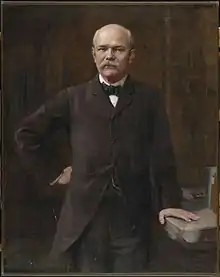Reginald Heber Fitz | |
|---|---|
 Reginald Heber Fitz, portrait by Ignaz Gaugengigl | |
| Born | May 5, 1843 Chelsea, Massachusetts, U.S. |
| Died | September 30, 1913 (aged 70) Brookline, Massachusetts, U.S. |
| Education | Harvard University |
| Occupation | Physician |
| Spouse |
Elizabeth Loring Clarke
(m. 1879) |
| Children | 3 |
| Signature | |
.png.webp) | |
Reginald Heber Fitz (May 5, 1843 – September 30, 1913) was an American physician known for his research on abdominal disorders.
Early life
Reginald Heber Fitz was born on May 5, 1843, in Chelsea, Massachusetts.[1] He graduated in 1864 (M.D., 1868) from Harvard University. He also studied in Vienna, Berlin, and Paris.
Career
He taught at his alma mater, Harvard University. He was instructor in pathological anatomy in 1870–1873, assistant professor in 1873–1878, and professor from 1878 to 1908. In the latter year, he became professor emeritus.
In 1886, he published "Perforating Inflammation of the Vermiform Appendix; With Special Reference to Its Early Diagnosis and Treatment". This groundbreaking paper provided analysis of 466 cases of abdominal disorders that had previously been variously diagnosed and showed that they all involved a diseased appendix. He also introduced the term appendicitis. Dozens of names had previously been used for what had been thought to be a variety of diseases.
He also served as physician to the Boston Dispensary in 1871–1882 and to the Massachusetts General Hospital from 1887 to 1908. In 1894, he was president of the Association of American Physicians.
Personal life
Fitz married Elizabeth Loring Clarke in 1879, and they had three children.[1]
He died in Brookline, Massachusetts, on September 30, 1913, after having surgery to remove a gastric ulcer.[2]
Bibliography
- The Practice of Medicine (with Horatio C. Wood, 1897).
References
- 1 2 Walcott, Henry Pickering (January 1919). "Memoir of Reginald Heber Fitz". Proceedings of the Massachusetts Historical Society. LII: 104–116. Retrieved March 17, 2023 – via Google Books.
- ↑ "Appendicitis Expert Passes Away in Person of Dr. Reginald Heber Fitz of Boston". Fall River Globe. Boston (published October 2, 1913). October 1, 1913. p. 9. Retrieved March 17, 2023 – via Newspapers.com.
- This article incorporates text from a publication in the public domain: The New International Encyclopedia (1st edition). Gilman, D. C. and Peck, H. T. and Colby, F. M., eds. New York: Dodd, Mead, 1905.